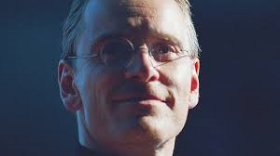 I’d be lying if I said my expectations hadn’t been dizzyingly high for Steve Jobs. Academy Award-winning director and screenwriter (Danny Boyle and Aaron Sorkin), and a powerful cast, headlined by Michael Fassbender and Kate Winslet, two of the best actors in the world—and that’s not even mentioning the subject, which is a glimpse into the psyche and genius, if you will, of perhaps the most influential inventor/entrepreneur of the late twentieth century. Yes, I couldn’t help but be excited to see this movie about the man who brought Apple back to life and might just be the one responsible for the computer revolution that has taken over the planet and our lives.
I’d be lying if I said my expectations hadn’t been dizzyingly high for Steve Jobs. Academy Award-winning director and screenwriter (Danny Boyle and Aaron Sorkin), and a powerful cast, headlined by Michael Fassbender and Kate Winslet, two of the best actors in the world—and that’s not even mentioning the subject, which is a glimpse into the psyche and genius, if you will, of perhaps the most influential inventor/entrepreneur of the late twentieth century. Yes, I couldn’t help but be excited to see this movie about the man who brought Apple back to life and might just be the one responsible for the computer revolution that has taken over the planet and our lives.
But, see, that’s just the thing. The movie Steve Jobs gives us one thing and I was looking for something completely different. I’m not saying that’s an entirely bad thing, but it left me a bit bewildered when I honestly wanted to be exhilarated. Steve Jobs, the movie, as written by Aaron Sorkin, directed by Danny Boyle and starring Michael Fassbender as the title character, is a dynamic, fast-paced, three act whirlwind of a movie that takes you into the eye of the storm known as Steve Jobs, a man who seemingly leaves nothing but heartbreak, anguish and broken egos in his wake. The film is structured in such a way so we only see Jobs at three times in his life, three very specific times in fact—literally the half hour before the launch of three of his products, the first in 1984 and the last in 1998. This structure is unusual and I applaud its theatricality and imagination, but, in the end, it prevents a true connection to character—flashbacks are forced, dialogue to fill in blanks for the audience feel shoehorned in and the structure ends up getting in the way of the story. And that’s what Sorkin forgets about: the story. Sorkin often falls in love with his own style and structure and forgets about what the audience came for, and here’s a classic example. The story of Steve Jobs should be the man and the machine and, more important than that, the design/concept of the machine: that’s what set Steve Jobs and Apple apart. What Steve Jobs the movie delivers instead is some sort of Shakespearean theatre piece that focuses way too much on structure and Jobs’ parenting skills instead of what the audience paid money to see: how the iPod was born. Sorkin got it so right with The Social Network, how did he get it so wrong here?
Thank goodness for Fassbender and Winslet. What saves this movie are the powerhouse performances these two deliver. When I say this is a three act play, I mean it. These two work hard for over two hours delivering monologue after monologue of rapid-fire speeches that are absolutely electrifying to watch. One thing Sorkin does well is serve his actors and Fassbender and Winslet rise to the challenge. Fassbender never betrays his character to demonize nor idolize him, and Winslet is utterly believable as the only person seemingly able to get close to the enigmatic Jobs but still unable to understand him. It’s so much fun to watch these two colossal talents work together on screen.
As for director Danny Boyle, I had to remind myself he directed Steve Jobs. I didn’t see many of his marks on this movie, apart from his possible collaboration on the cinematography with Alwin H. Kuchler and the score with Daniel Pemberton, both of which I noticed (and was impressed with) more than the direction.
In the final analysis, I guess I was looking for more breadth and got instead an incredibly detailed and focused view of one man in three specific points in time. Risky, brave, unique, challenging and different? Yes to all. Sadly, for me, I can also say disappointing and restrictive.
